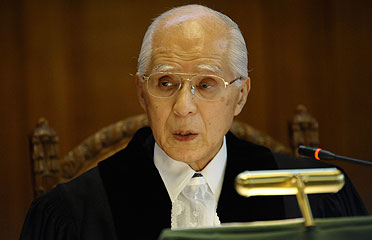
Having upheld one of the Russian Federation’s preliminary objections, the Hague-based International Court of Justice (ICJ) ruled on April 1, that Georgia’s case against Russia “can not proceed to the merit phase.”
By ten votes to six the Court found that “it has no jurisdiction to entertain the application filed by Georgia on the 12th of August, 2008”, President of the International Court of Justice, Judge Hasishi Owada, announced at a public sitting of the court.
In its case filed before ICJ more than two years ago, Georgia claimed that Russia violated its obligations under the 1965 International Convention on the Elimination of All Forms of Racial Discrimination (CERD) during three distinct phases of its interventions in South Ossetia and Abkhazia in the period from 1990 to August 2008.
But before the Court moved to consideration of the application on its merit, the Russian Federation in December, 2009 filed its preliminary objections arguing that ICJ had no jurisdiction to hear the case.
Russia’s claim was based on several arguments; one of them argued that there had been “no dispute” between Tbilisi and Moscow over racial discrimination against the ethnic Georgian population of Abkhazia and South Ossetia and that Tbilisi had never formally raised the issue directly with Moscow.
This argument was rejected by ICJ saying that “by the day on which Georgia submitted this application there was a dispute” between the two countries about Russia’s compliance with the obligations under CERD.
Another argument put forth by Russia to claim that ICJ had no jurisdiction to hear the case on merits was related with procedures as defined in Article 22 of CERD; Russia argued that before going directly to ICJ, Georgia should have at first raised the issue before the UN’s Committee on the Elimination of Racial Discrimination and should have engaged in negotiations with Moscow on the matter.
The Court upheld this argument by Moscow and said that Georgia neither attempted to negotiate specifically CERD-related matters with the Russian Federation nor used other mode of dispute resolution contained in Article 22 before referring the case directly to ICJ.
ICJ’s April 1 ruling comes after it held public hearings into Russia’s preliminary objections in September, 2010.

 RSS
RSS Mobile
Mobile Twitter
Twitter Facebook
Facebook